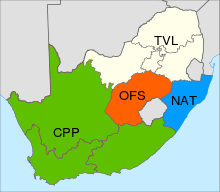Cape Provinces
This article is about a biogeographic area of South Africa. For the former South African province, see Cape Province. For the marine biogeographic region of Australia, see Cape Province (IMCRA region).

WGSRPD areas of South Africa; CPP = Cape Provinces
The Cape Provinces of South Africa is a biogeographical area used in the World Geographical Scheme for Recording Plant Distributions (WGSRPD). It is part of the WGSRPD region 37 Southern Africa. The area has the code "CPP".[1] It includes the South African provinces of the Eastern Cape, the Northern Cape and the Western Cape,[1] together making up most of the former Cape Province.
The area includes the Cape Floristic Region, the smallest of the six recognised floral kingdoms of the world, an area of extraordinarily high diversity and endemism, home to more than 9,000 vascular plant species, of which 69 percent are endemic.[2]
|
37 Southern Africa
|
See also
- Category:Flora of the Cape Provinces
- Northern Provinces
References
- 1 2 3 Brummitt (2001), p. 38.
- ↑ Odendaal, L.J.; Haupt, T.M.; Griffiths, C.L. (2008), "The alien invasive land snail Theba pisana in the West Coast National Park: Is there cause for concern?", Koedoe, 50 (1): 93–98, doi:10.4102/koedoe.v50i1.153
Bibliography
- Brummitt, R.K. (2001). World Geographical Scheme for Recording Plant Distributions: Edition 2 (PDF). International Working Group on Taxonomic Databases For Plant Sciences (TDWG). Retrieved 2006-11-27.
This article is issued from Wikipedia - version of the 1/29/2016. The text is available under the Creative Commons Attribution/Share Alike but additional terms may apply for the media files.